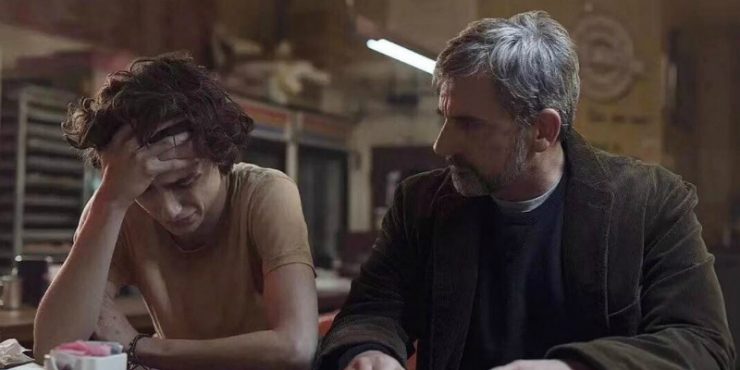The memoirs of David and Nic Sheff are the source material for the script of Beautiful Boy, a dreamy addiction narrative told from perspective of the addict and the addict’s father simultaneously. Director Felix Von Groeningen (known for The Broken Circle Breakdown) imbues the movie with a romantic, ethereal feel, an attempt to lift you up with exuberance before cutting you down as the vicious cycle of drug addiction wears the audience down. Beautiful Boy is more melancholy than despairing, not compromising in the harsher details of crystal meth use, but incredibly sentimental in its portrayal of recovery and parental strife. At times, the film feels more like a soundtrack film than an addiction film.
Steve Carrell plays David Sheff, a journalist who’s written for several major magazines, including Rolling Stone. Timotheé Chalamet plays Nic, his teenaged son who’s been accepted to half a dozen colleges. Nic doesn’t get to go to college, though, not immediately, because he’s instead checked into a rehab facility after David finds him strung out on methamphetamine. Nic is a child of divorce, though his life is hardly tumultuous. David got remarried to Karen (Maura Tierney), a kind, understanding painter, with whom he had two more children. The children and Nic adore each other in equal measure, and they live in a remarkably beautiful cabin in Bay Area, California, a perfectly normal portrait of the American upper class.
Nic’s mother, Vicky (Amy Ryan), lives in Los Angeles and is mostly out of the picture, save for trips during the Summer and on holidays, but this doesn’t seem to bother Nic much. David and Vicky’s relationship is tinged with unsaid iciness that is hardly spoken to because it’s so readily apparent. Still, Nic’s life is far from upsetting and his slip into drug use seems incredibly unspectacular, a casual slide from admiring the soft buzz of marijuana to chasing the high of something harder. Realizing a problem, David becomes obsessed with fixing his son, but he proves ill-fitted to deal with addiction. Naïve and uneducated in the world of drugs, David doesn’t yet understand the persistence of Nic’s habit, and it takes a decade of turmoil before father and son realize the complete lack of control that either have on the situation.
Nic’s room is decorated with endless iconography of artists undone by self-destruction. He reads misanthropic authors in his spare time, and seems to buy into the quaintness of artist-as-sufferer. He listens to Nirvana, reads F. Scott Fitzgerald, memorizes poems by Charles Bukowski. The film’s script (by Van Groeningen and Luke Davies) draws the lines between the artists Nic admires and his own substance abuse, but stops short of suggesting causation. That said, too often Beautiful Boy falls into the same trap of proving that personal tragedy can lead to artistic triumph. Nic’s struggles and David’s obsession led to two best-selling books and one artfully-made film, and I’m not sure it ever really gets to the bottom of what drives someone to take crystal meth to begin with, outside of chasing some lost ideal.
Beautiful Boy is trying to fit a years-long arc into a single film, so it makes sense that some of the details get skimmed. If it really wants to be about anything, it wants to be about how far the tendrils of addiction reach, surpassing the addict and terrorizing entire families. In this regard, the film is slightly unique but not exactly successful. The film’s most honest, effective sequences deal more directly with Nic’s struggles, not with David’s. This mostly has to do with Chalamet’s performance, which provides a perfect mixture of charm and anguish, a perfect portrayal of the vulnerability of youth. Nic’s denial of his problems paired with his morbid fear of disappointing his father is a toxic combination, and Chalamet brings this all across in truly heartbreaking fashion.
I guess on paper Steve Carrell should be perfect for this part, but something felt off. The character is completely shut off from the humor that has made Carrell such a cherished performer to begin with. I don’t feel like we need Carrell to be so serious in order for us to take him seriously, and it is in that regard that I feel like his casting is inappropriate, even while the actor does solid, effective work. As Laura, though, Tierney shines in a smaller, but more profound performance. Nic’s step-mother, Laura finds herself in constant uncomfortable ground, trying to provide what she knows only David can. Every scene is a measurement for Laura, a figuring of just how much she can step in to save Nic from himself.
There’s a neatness to Beautiful Boy that isn’t quite my cup of tea, belying the complications within the Sheff family, but the script is clear on the important parts: addiction cannot be cured, and can only be managed with great effort. It tries to toe the line between hopefulness and helplessness, and why its hard to keep up the former when its always dogged by the latter. I get the sense that this story can help a lot of people if seen at the right time, providing the proper understanding of the toll that drug use can take on everybody, not just the user. And that is where this film is coming from: it’s sounding an alarm for those who feel they can control what they can’t.
Directed by Felix Van Groeningen










